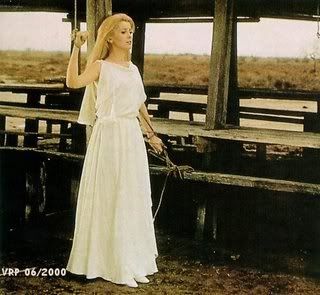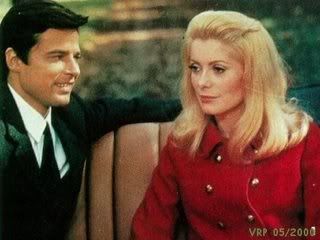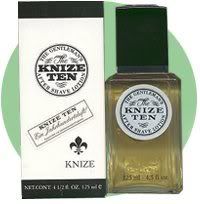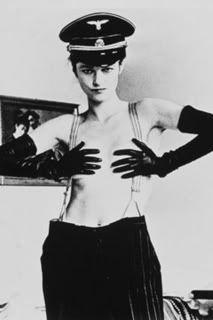"I don't know what possesses me, but I have a terrible tendency to fall in love with fragrances right before they get discontinued. I've just done it again. I need my head examined.
I've had a decant of Eau de Camille lying around forever, just finished it up this past spring. I've pondered a bottle off and on but never got around to it. Then I heard last week here on POL that Annick Goutal was discontinuing it, so I checked the site and sure enough, it's gone. This is where a sane person would sigh and shrug and decide it wasn't meant to be. I, on the other hand, said "Hey! Sounds like it's finally time to get that bottle!" Which I did (half price on Amazon, which didn't help).
And now it's here, and I can't believe how insanely great it is. Ivy! Privet! Grass! Stemmy green goodness with a hint of spring flowers! It's like a garden party in a bottle. Honeysuckle in the verge, croquet on the lawn. Playing amongst the hedges. It's much fresher than my decant, which makes me suspect it does deteriorate, and if course it's DISCONTINUED so I'll need to keep it in the refrigerator or something because I am a TOTAL IDIOT.
Anyway. It's a sweetheart of a fragrance, and hopefully I'll be sick to death of it before it runs out".
 |
| via latimesblogs.latimes.com |
I'm in love with extreme mental torture.~No Peace for the Wicked, The Only Ones
I'm in love with the way you hold your head and just cry.
I'm in love with all these affairs of the heart.
There's no peace for the wicked.
Loud and clear. The angels tell me,
no peace for the wicked.
I well recall my own days when I had first discovered Lanvin's seminal My Sin (Mon Peche), a long discontinued marvel allegedly composed by the "mysterious" and "exotic" Madame Zed (so much has this stirred the collective conscious that even entire chick-lit novels are built on this tidbit). The panic to secure every possible concentration (there's eau de toilette, extrait de parfum but also Eau My Sin, a slightly different proposition), the hawking over auctions, the frenzied correspondence with Swiss perfume collectors and finally the pain in using it in measured drops on my neck and behind my knees resembled Severin's unbridled desires for Wanda; or so it seemed at the time... That scent adventure was followed by many others over the years: limited editions of YSL Opium (such as the stupendous Fleur de Shanghai), the sweaty leathery La Nuit de Paco Rabanne, the innocuous but filled with memories Eau d'Eden, Guerlain's scarce Loin du Tout, the origami darkness of Shiseido Nombre Noir, Chanel No.46 and its troubled history, or the buttery softness that one would wish would come as luxe underwear for fetishists, Doblis by Hermès...Each and every one of them a doomed bond, a predestined to wither and die love affair; not because of anyone's fault...because that was the way it was meant to be.
And with the increasing axing of many of the classics, due to allergens, poor sales or impossible to serve financially formulae, the story only takes on additional chapters, like a mutant 19th century novel by Eugène Sue, serially published in sepia periodicals.
Let's be factual: Masochism is unique to man (woman); animals do not seek to get unaccomodated, only humans do (and with such fervor!) And since by its own definition masochism is pessimistic and realistic, as Gilles Deleuze showed in his brilliant reasoning, it's quite noble to fall for a lost cause. Thermopylae didn't get famous for being a victorious occasion after all.
In appreciating fragrance for its intellectual properties (its transient beauty, its capturing of the zeitgeist but also of a personal scent timeline) the direct object itself is desexualized, gaining heroic nuances that go beyond the carnal, into the spiritual, whereas the entire human history is sexualized, i.e. put under a new light because everything surrounding that experience gains an unforeseen intensity spanning the senses. Far from a libertine tittilation, indulging in a paradise lost is an exercise in banishing the role of authority, the paternal figure, in submerging oneself into a primal Oedipal status. Securing a discontinued perfume is defiance; revolt against the system; appreciation of what is (by now) forbidden to you. The quest becomes the hunt for treasure, the securing of the loot a prize in itself; the impossibility of refueling nevertheless means an acceptance of mortality. In a way, loving discontinued perfumes has helped me mature.
So go ahead and fall headlong with a discontinued fragrance, don't be scared! You will derive a poignant pleasure in enjoying what fragrance you have left in your bottle, each application all the more tinged with melancholy because it's running out. In a way, wearing a beloved discontinued scent is like finding a virtuous woman, prized above rubies. And the more gorgeous, the more artistically beautiful the fragrance is, the more elevated that experience is.
What about you? Do you feel that way? Do you love certain discontinued scents or do you just go on when something gets axed? Please share in the comments.
.jpg)










